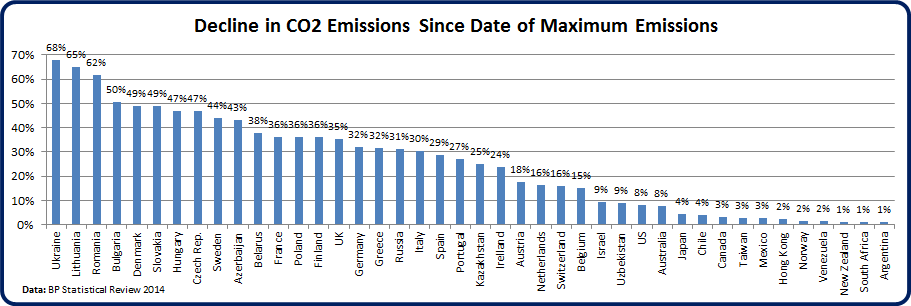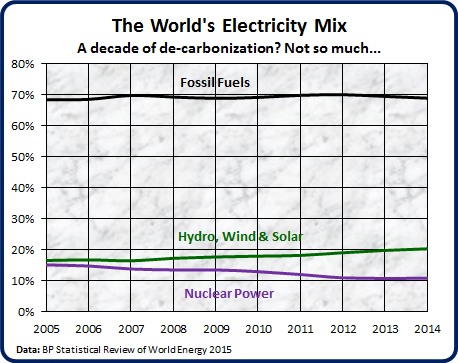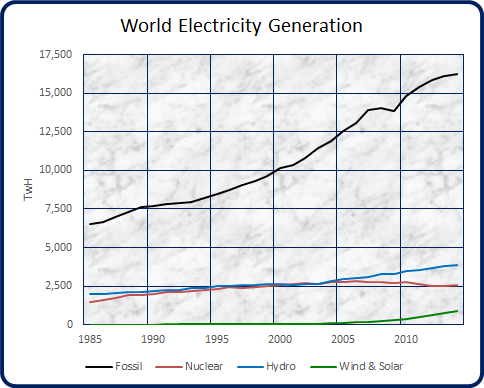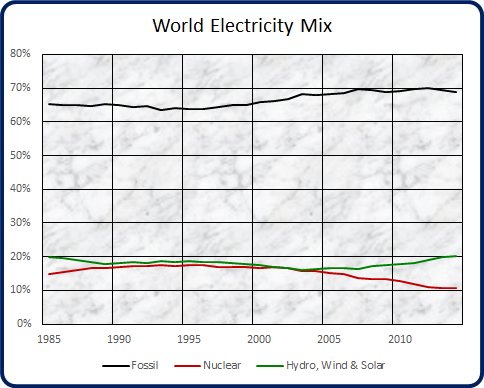Environment & Energy
Related: About this forumDeclining CO2 emissions around the world
I did some more data mining of the BP Statistical Review of World Energy 2015 related to national CO2 emissions. The results are very interesting.
The BP data breaks out 67 individual nations. Emissions have declined in 42 of them. their current emissions represent 46% of the world's total current CO2 emissions. Since their peaks, the decliners have shed a total of 20% of their emissions. This decline represents 11% of today's CO2 production.
The Eastern European countries caught in the collapse of the USSR have generally reduced their emissions the most, but Denmark, Sweden, France and Germany also had notable declines, as did much of Western Europe.

Considering the peak years of emissions - the years in which declines began - the collapse of the USSR and the world financial crisis of 2008 are clearly visible. the trends in IK, Sweden, Hungary, France, Germany, and Bulgaria are of longer duration. The UK decline of 35% since 1973 along with the declines in Hungary and Bulgaria appear to be due to long-term losses of economic activity (caveat - I haven't correlated the reductions to GDP performance yet.)

My conclusions:
It looks as though it is possible to achieve at least modest national reductions in CO2 emissions, so long as some stagnation or reduction in economic activity is recognized as the price. Will this carbon/economy relationship hold in the years to come? I think it will, more or less. Regardless of how fast (or if) renewable energy displaces fossil fuels, the more a country's economic output declines, the better their chance of reducing carbon emissions.
Edit to add: Unfortunately, since 2000 the world's total CO2 emissions have increased by 39%...![]()
OKIsItJustMe
(19,938 posts)e.g. China’s emissions have increased tremendously, partly because they’re manufacturing stuff that used to be manufactured elsewhere (like the U.S.)
However, renewables are beginning to have a positive effect on carbon emissions.
http://www.bp.com/en/global/corporate/about-bp/energy-economics/statistical-review-of-world-energy/review-by-energy-type/renewable-energy/renewables-in-this-review.html
At the individual country level these sources are already playing an important role in some countries. Denmark leads, with 57% of power coming from renewables, followed by Portugal with 30%. Among the larger EU economies, the renewables share is 26% in Spain, 24% in Italy, 23% in Germany and 18% in the UK.
The rapid growth of renewable power generation continued in 2014, with an increase of 12%. Traditionally Europe and Japan have been the leaders in renewable development, on the back of generous government incentives, but now the US and China have moved to the front with significant investments in wind capacity in particular. The renewable energy industry is rapidly gaining importance in terms of contribution to the economic activity and employment.
GliderGuider
(21,088 posts)It's merely offsetting the decline in nuclear generation. Maybe as time goes on it will reduce emissions, but so far it has not.

Your point about outsourcing is correct. That's one reason why Chinese (and therefore global) emissions continue to rise.
OKIsItJustMe
(19,938 posts)Electricity generation has increased dramatically. In 2004, total world generation was 17573.3 TWH, while in 2014 it was 23536.5 TWH (an increase of roughly ⅓.)
Nuclear power decreased somewhat (from 624.7 TWH in 2004 to 574.0 TWH in 2014—about 9%) but not as much as your graph seems to suggest, because your graph shows it as a decreasing percentage of a rapidly growing total.
Were it not for the growth in renewables, I believe the growth in fossil fuels would have been even greater, and so, in that sense, I believe they are having a positive effect (i.e. in reducing “potential emissions.”)
GliderGuider
(21,088 posts)

The only thing that is slightly encouraging about the absolute numbers is that the growth in FF electricity appears to be flattening out over the last three years. In terms of carbon per KwH we don't seem to be doing as well as we were 20 years ago, before China got into the fray.
The real question though is, with 400 ppm of CO2 already in the atmosphere, how much time to we really have left to make changes that will keep us below even a highly dangerous 2C rise? We know that Bill McFibben's 350 boat has long since sailed, and with every passing year the horizon grows darker.
OKIsItJustMe
(19,938 posts)First, that’s Hansen’s 350 boat.
Second, he did say that we need to minimize the duration of the overshoot (acknowledging that we would overshoot 400.)
Third, he acknowledged that 350 was probably too high itself.

Renewables alone won’t get us to 350. No way, no how. They cannot remove CO₂ from the atmosphere which is already there. We would need some way to capture and sequester it on a large scale, whether it is bio-engineered “carbon eating trees” or fusion-powered carbon-sucking vacuum cleaners.
pscot
(21,024 posts)definitely sound like the way to go. We'll need a bunch of them.
GliderGuider
(21,088 posts)It takes natural processes around 700 years to remove 1 ppm CO2 from the atmosphere.
Just to get back to 350 from here will take on the order of 35,000 years unless we find a way to do something we have never done before: take large quantities of carbon out of the raw atmosphere and lock it away forever.
Every year we delay costs us another 1500 years in overshoot...
OKIsItJustMe
(19,938 posts)
Hansen (et al) suggested a few ways to bring the carbon levels back down. CCS was seen as pretty much of a must. CCS with biofuel could be a “net negative.” Agricultural methods (like biochar) would be another possible net negative.
In any case, there’s no way to get back down to 350 ppm without active sequestration efforts.
The point in aiming at 350, even though it is probably too high, is that since we were fast approaching 400 ppm, in order to get to 350 ppm, we would need to develop methods, which could be employed to bring the level even lower (as needed.)
GliderGuider
(21,088 posts)Catching 300+ gigatonnes of CO2 is going to take a lot of joules. Maybe that's what we should use the remaining fossil fuels for... ![]()
OKIsItJustMe
(19,938 posts)Although Freeman Dyson gets mocked, he has advocated sequestering carbon using trees since the 1970’s (i.e. well before “climate change” became a name people recognized.)
https://www.sciencedirect.com/science/article/pii/0360544277900330?np=y
Hansen recomended it in the 90’s.
http://www.researchgate.net/publication/248353749_Soil_carbon_sequestration_beneath_hybrid_poplar_plantations_in_the_North_Central_United_States
Now, clearly, the reason we burned all of that fuel was to produce energy. If we wanted to reverse the process, say… produce a solid block of pure carbon, something like… uh… coal, we’d have to “put all of that energy back into the system.” However, if we sequester CO₂ instead, that would take a good deal less energy. (Still, a lot of energy, but a good deal less…)
Cultivating GMO plants to sequester all that carbon would be one heck of an undertaking, but might be more feasible than some mechanical method.